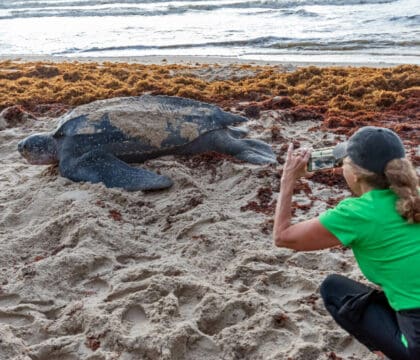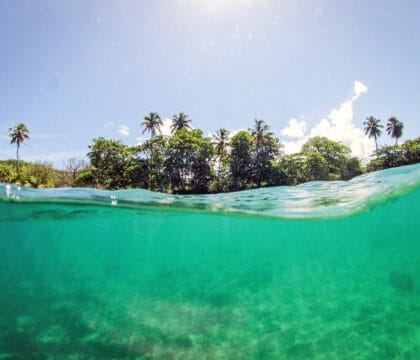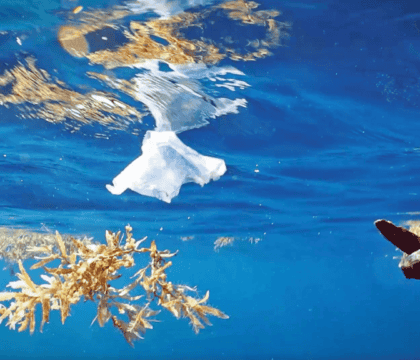January 29, 2024 • Program Updates
We are proud to announce that Oceanic Society has awarded 19 small grants to sea turtle conservation projects in Cabo Verde, Colombia, Costa Rica, Indonesia, Madagascar, Mexico, Nigeria, the Philippines, Solomon Islands, Tanzania, and the United States. The grants were made as part of our State of the World’s Sea Turtles (SWOT) Program, a global effort to support and strengthen local sea turtle conservation.
Since 2006, SWOT’s small grants have helped field-based partners around the world to realize an array of important research and conservation goals. To date, 160 grants have been awarded to 125 applicants in more than 57 countries and territories. The grants awarded in 2023 were made possible through generous support from the Betlach Family Foundation, the Joseph S. and Diane H. Steinberg 1992 Charitable Trust, the Moore Family Foundation, and the AZA-SAFE program, as described below.
For the fifth consecutive year, SWOT partnered with the Association of Zoos and Aquariums (AZA) and its Sea Turtle SAFE (Saving Animals from Extinction) program to make 12 additional grants for projects related to the conservation of two of the top global priorities for sea turtle conservation—eastern Pacific leatherbacks and Kemp’s ridley turtles. Those grantees are marked with a (*) on the list below.
Meet Our 2023 Sea Turtle Grant Recipients

Sea turtle patrol dog Kilo has many fans! He not only protects nesting turtles but also raises awareness in the community. © Fundação Tartaruga
Fundação Tartaruga (Cabo Verde) will bring one of their beach patrol protection dogs, named Kilo, to local schools in Boa Vista to raise awareness and inspire children to care for nature by protecting sea turtles, not consuming or selling turtle products, and reducing and recycling plastic waste.
Sea Sense (Tanzania) will expand its current conservation and research programs by training groups of community “conservation officers” in techniques to better understand, monitor, and protect sea turtle foraging habitats and assure safe connectivity to nesting beaches.
Tetepare Descendants Association (Solomon Islands) will provide necessary field equipment and training to its rangers, thereby strengthening its sea turtle nesting beach monitoring program that protects animals and gathers valuable conservation data in partnership with local and international partners.
Science of Identity Foundation (SifCARE) (Philippines) will educate children and community members on plastic pollution mitigation and sea turtle conservation through their CURMA Reef Experience Program. Participants will strengthen their connection to nature through beach cleanups and activities to maintain sea turtle hatcheries.

Sea turtles can help connect people with nature and create ocean stewards. © SifCARE
Safe Earth Foundation (Nigeria) will hold a workshop for artisanal fishers and law enforcement agencies to strengthen local participation in marine conservation and bycatch data collection, and encourage more proactive and efficient enforcement of illegal take laws.
National Center for Environmental Research (CNRE) (Madagascar) will conduct a field-based assessment in the Besalampy coastal region of Northwestern Madagascar to fill data gaps on nesting sea turtles that will inform population estimates, create an inventory of nesting sites, understand habitat use, and build a conservation strategy.

© Anambas Foundation / Abdulrahman Ritonga
Anambas Foundation (Indonesia) will encourage local involvement in sea turtle conservation and tourism in the Anamabas Islands Marine Protected Area by combining socio-ecological research and community engagement.
* Sea Turtle, Inc. (U.S.A.) will host a STEM Summer Camp, at which teenagers will study ocean conservation through water quality measuring, marine species ID, and field trips to document microplastics. Participants will advance their scientific literacy, and learn how to help oceans and Kemp’s ridleys.
* Centro ECOMAR-UAGro (Mexico) will teach students and fishermen from Guerrero about sea turtles, including eastern Pacific leatherbacks, and how to diminish fishery bycatch and to behave in ways that positively impact sea turtles and the ocean.
* Campamento Tortuguero Ayotlcalli A.C. (Mexico) will lead an outreach and education campaign – Warriors of the Rainbow – aimed at school-aged children, community members, fishermen, and service providers to keep eastern Pacific leatherbacks and their habitats safe.
* Kuemar (Costa Rica) will conduct educational talks for tourists and operators at three important eastern Pacific leatherback sites. The project aims to reduce disturbances to nesting females, and raise awareness about the consequences of improper waste disposal.

Fishing practices and discarded gear are the number one threat to sea turtles. This Kemp’s ridley turtle was lucky enough to have this hook removed from its mouth. © South Carolina Department of Natural Resources (SCDNR)
* South Carolina Department of Natural Resources (SCDNR) (U.S.A.) will post bilingual signs at coastal piers in South Carolina with NOAA’s “Recommendations to Reduce Injuries if You Hook or Entangle a Sea Turtle,” and stranding hotline information to ensure rescue of injured and cold-stunned Kemp’s ridleys.
* JUSTSEA Foundation (Colombia) will provide port-side training, workshops, and presentations to anglers and fishing cooperatives, to reduce leatherback bycatch, foster collaboration, and promote sustainable fishing practices that reduce sea turtle impacts.
* Elizabeth Labastida Estrada (Mexico) will obtain, for the first time, viral sequences of ChHV5, the virus that causes fibropapillomatosis, from Kemp’s ridley turtles in Rancho Nuevo to determine if there are genetic variations that distinguish the viral strain from that found in other sea turtle species.
* César Paúl Ley-Quiñónez (Mexico) will quantify the concentrations of trace elements in the blood of nesting Kemp’s ridleys at Rancho Nuevo to determine potential threats to population health and learn more about toxic pollutants, a poorly known threat to Kemp’s ridley turtles.

As one of the most endangered sea turtle populations, it’s important to understand all of the threats to eastern Pacific leatherbacks, including the quantity and identity of trace metals that the mother turtle passes on to her babies. © Mildred Alpizar Quezada
* Mildred Alpizar Quezada (Mexico) will evaluate the concentration of trace metals in dead leatherback hatchlings found at Playa Tierra Colorada, one of the main nesting beaches for eastern Pacific leatherbacks in Mexico.
* GroBios A.C. (Mexico) will create standard protocols for projects in Guerrero state to conserve eastern Pacific leatherbacks and their habitats. They’ll also conduct training and provide institutional strengthening support to fill data and protection gaps throughout the state.
* Gladys Porter Zoo (Mexico) will initiate a PIT tagging program at Altamira and Miramar, two important satellite nesting beaches for Kemp’s ridleys near Rancho Nuevo, as part of the Mexico-U.S. Binational Kemp’s Ridley Recovery Program.
* Universidad Michoacana de San Nicolas de Hidalgo (Mexico) will conduct research at Mexiquillo, a historically important nesting beach for eastern Pacific leatherbacks, that will determine the sex ratio of hatchery nests, and help to inform conservation efforts for this rookery.

© Carlos Delgado-Trejo




